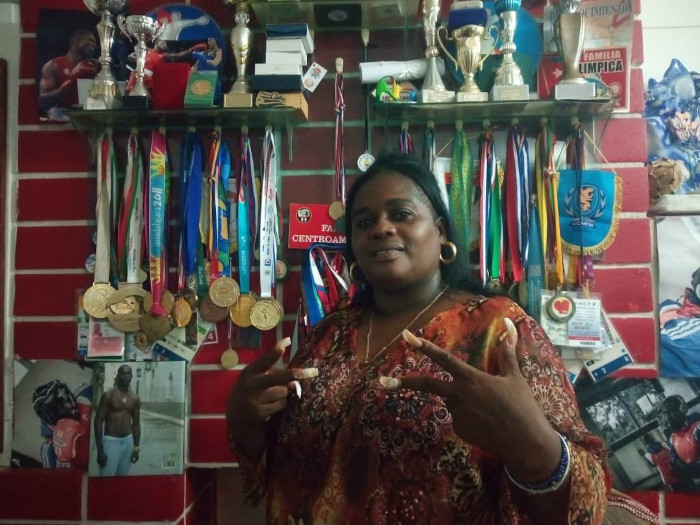CAMAGÜEY.- This fight began, perhaps, the day that Julio César received his two surnames or probably earlier, when he began to be gestated in Ana's womb. But today we will skip many chapters and go to the events of this August 6, 2021 , a rare date for an event that has insisted on keeping the name of Tokyo 2020.
Minutes before the warm-up began, they spoke. Although he wanted to convey security, he ended up worried: "If you're going to get like the other day, don't watch the fight, but you can be convinced that I'm going to give you the victory," he told her.
He rang the bell. When the Russian Muslim Gadzhimagomedov went out in search of him, Anita and Julio began to move. She walked to the door, looking away from the TV and he took two steps to the left, one to the right and launched the first straight. "La Sombra," as he is called in Cuba, he constantly turned his guard down and unleashed two-hit combinations after dodging the violent swings of his rival. His mother saw little of the first round, but someone yelled at her that he won it 4-1.
A week earlier, after the controversial fight against the Cuban-Spanish Enmanuel Reyes and his closing sentence, they began to experience intense and contrasting moments at home. “Several people wrote swear words and threats without knowing us. Things got to such a point that the boys (Julio's friends) came running one afternoon because they read in the networks that they had attacked the house with stones, but the truth was that we received a lot of support and affection from the people, ”Ana said.
Returning from the corners for the intermediate round, The Doctor, as he once called himself, went with the indication to convince even more. He responded immediately with more exchanges and hitting effectiveness. He taunted his opponent to make him miss and respond with flashes of jabs. Meanwhile, his mother sat at the back of the room with her eyes on the altar of her Orula. The three minutes passed.
Friends, family and coaches encouraged each other and there were even those who dared to toast in advance with a little cheap rum, the kind that they offer him when he comes and that he always accepts. Because Chachá's friends, as they know him in La Zambrana and Plaza San Juan de Dios, are the same as always, the ones who shared the piece of bread and the glass of syrup, the bad news and the drum parties.
In the blue corner of the ring he remained standing and listened to the 5-0 vote in his favor, a certainty that helped him to go out to finish the job more elusive than ever, because in heavyweights anyone sends you to the canvas with one blow and the Russian does it quite often. He never stopped dancing from side to side, always pulling back and stopping Gadzhimagomedov dead. Time and the clumsiness of the man in red were his allies, but so was his mother, who at that time was already strong enough to be standing in front of the transmission attacking the air. And so they were, until the final bell.
The judges of conscience and remote control who attacked so much were biting their tongues while unanimously in several languages announced the second Olympic reign of the boy who bears only his maternal surnames. To the center of the ring, the only fighter who has won the Olympics in light heavy and heavyweights, the conqueror of the 40th gold medal in Cuban boxing under five hoops, the eighteenth man in history to climb to the top of the podium in two or more consecutive summer events.

But Julio did not choke on all that glory that would have blinded others. He looked for the camera to say: "I love you, Cuba, I love you mom." And Ana, who had also fallen to the ground after so much emotion and so many years of fighting alone for her son, her boxer, replied with: "I love you more."
For those of us who know him, it is easy to decode that love for something as big and abstract as Cuba: they are his handsome and half-lazy friends; the old men who raised him with scolding and whom he always visits; the people he helps with a few pesos or a few kisses; his brothers of religion; coaches and teammates from EIDE to La Finca; the kids he plays soccer hidden from the coaches; the picket that hits him at the disco; the "consorts" of dominoes; the doctors and nurses who cured him from a gunshot and now save COVID-19 patients; the mechanic who does not want to charge you for the repair of the car; the vegetables' seller who lowers his food or the boys from the University who queue to take pictures with him. And Ana decoded all that from her home, in the early Cuban morning. And the one who has cried and fought to make Julio the man he is, she felt at peace again. Because she knows that Cuba, she loves him too.
Translated by Linet Acuña Quilez



